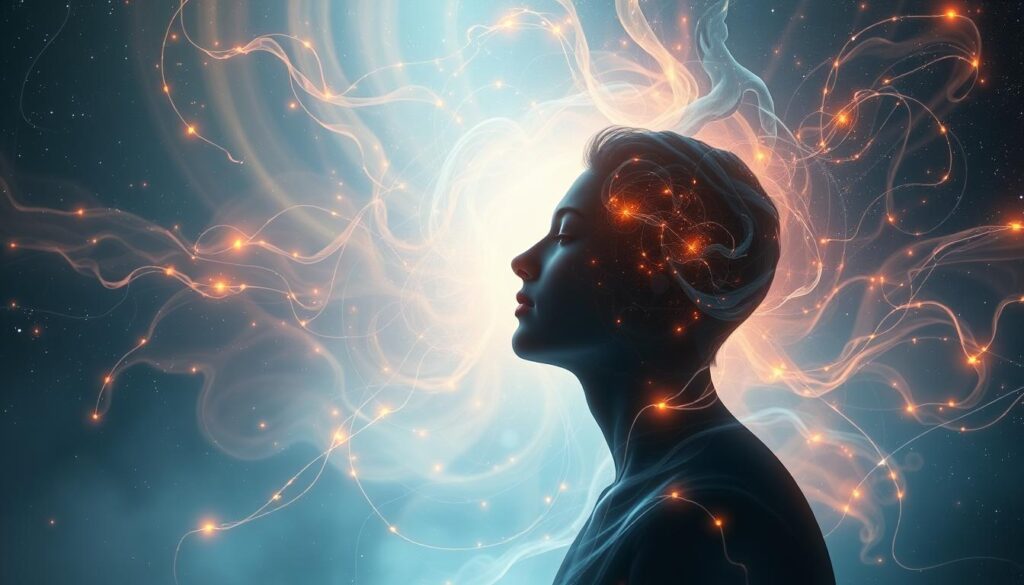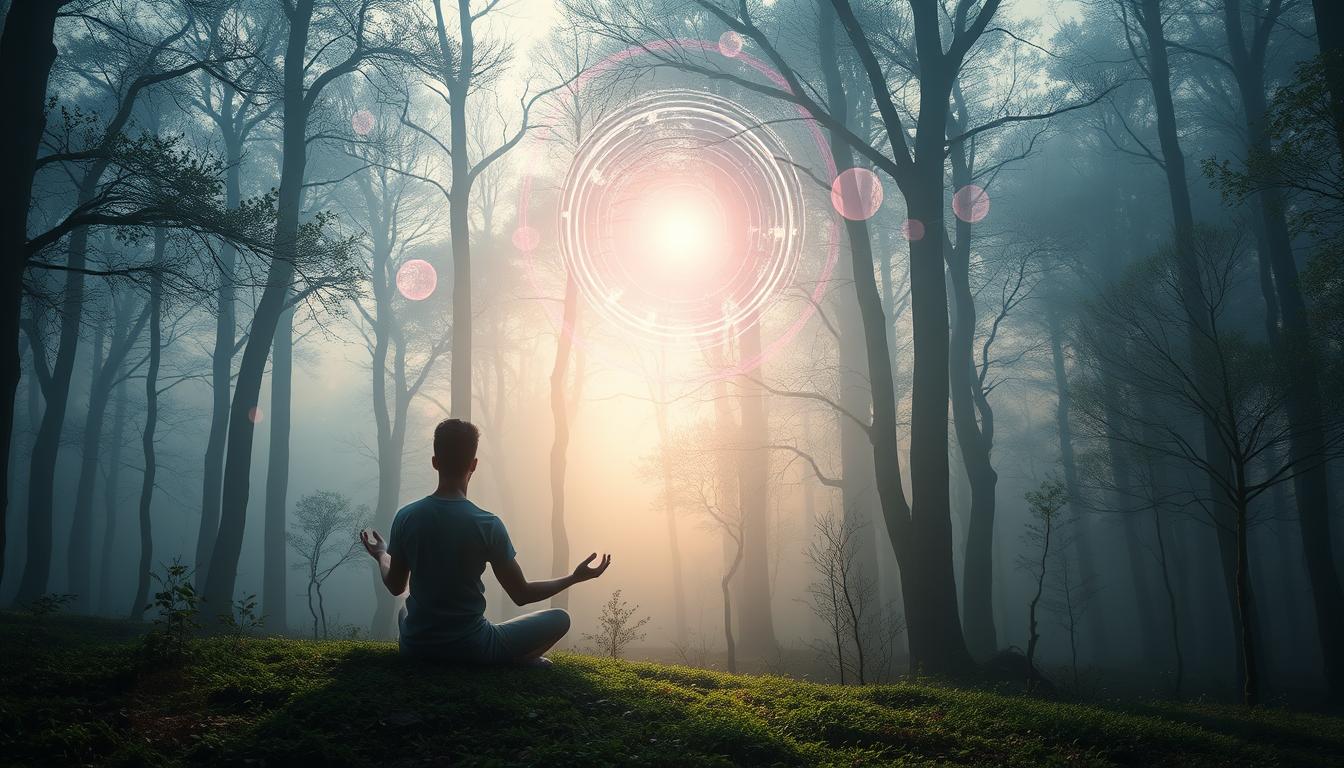Ever thought about psychokinesis (PK) and psi phenomena? They’re not just in science fiction. Noetic experiences like telepathy and precognition have been seen worldwide for centuries. Despite the taboo, science is finding proof that these abilities might be real.
Recently, 521 English-speaking adults shared their stories of noetic experiences online. They talked about things that go beyond our usual understanding of time and space. The study found five main themes in their stories.
People described their experiences, from feeling empathy to sensing the future. These stories show that psi phenomena might be more common than we think. They could be a natural part of who we are, waiting to be understood.
Key Takeaways
- Noetic experiences, including psychokinesis and other psi phenomena, have been documented throughout history and across cultures worldwide.
- Growing scientific evidence suggests that these experiences may be a genuine aspect of human consciousness.
- A recent online survey of 521 English-speaking adults revealed five main themes in personal accounts of noetic experiences.
- Noetic experiences may range from common phenomena like empathy and intuition to rarer experiences like sensing the future.
- These accounts provide compelling evidence that psi phenomena could be an innate human capacity waiting to be fully explored and understood.
The Mysterious World of Noetic Experiences
Have you ever felt a deep sense of inner wisdom or direct knowing? These moments, known as noetic experiences, intrigue many. They show our extended human capacities in action.
For centuries, people from all walks of life have shared stories of mystical experiences. These stories come from ancient India to modern religious movements. They all seek inner wisdom and direct knowing.
These experiences share common traits. People often feel timeless, connected to everything, and transformed. Scientists try to understand these experiences by studying their nature and effects.
“The most beautiful and profound emotion we can experience is the sensation of the mystical. It is the sower of all true science.” – Albert Einstein
One person had a life-changing experience after surgery. They gained deep insights into the universe. This shows how noetic experiences can change our view of reality.
| Psi Application | Description |
|---|---|
| Communication and Control | Telepathy, remote viewing, psychokinesis |
| Healing | Psychic healing, energy healing |
| Intelligence | Gathering information through psi means |
| Forecasting | Precognition, prophecy, divination |
| Archaeology | Psychic archaeology, locating artifacts |
| Dowsing | Locating water, minerals, or objects |
| Counseling | Psychic counseling, mediumship, channeling |
Many are curious about psi phenomena, but few study it. Yet, surveys show most academics find it interesting. Psi’s uses, from healing to dowsing, bring in billions of dollars each year.
Derren Brown: Demonstrating the Power of the Mind
Derren Brown is a famous mentalist known for his amazing tricks. He has amazed people all over the world with his mind-bending acts. His shows make us think about how powerful our minds really are.
Brown’s tricks include mind-reading and telepathy. He uses psychology, suggestion, and tricks to make it seem like magic. He shows us that what psychics do can be done without magic.
Recreating Psychic Abilities Through Illusion
Brown is great at making a seance or faith healing feel real. He uses suggestion and our desire to believe to make it seem like he’s talking to spirits or healing people.
“I don’t claim to have any supernatural powers. I’m just using a combination of psychology, misdirection, and showmanship to create the illusion of the paranormal.” – Derren Brown
Brown knows a lot about mentalism. He can guess what people are thinking and predict the future. It’s like he can read minds.
The Implications of Brown’s Performances
Derren Brown wants us to think twice about psychics and spiritualists. He shows us that their tricks can be done by anyone. He teaches us to be skeptical and think for ourselves.
Brown also shows us how amazing our minds can be. He uses tricks and psychology to make us see how powerful our minds are. He encourages us to explore our own minds and not limit ourselves.
The Bayesian Approach to Evaluating Psychic Claims
When we hear about psychic abilities, we should be skeptical. We need to think of other reasons before saying it’s supernatural. Bayes’ Theorem helps us figure out the chances of different explanations.
Bayesian analysis is becoming more popular in science, including parapsychology. It helps us compare the chances of psychic powers versus other explanations. We look at prior beliefs, what counts as evidence, and the risk of making mistakes.
Applying Bayes’ Theorem to the Question of Witchcraft
Let’s look at witchcraft as an example. In the past, strange events were blamed on witches. But Bayesian analysis shows that these could have natural causes. This challenges the idea that witchcraft is the only explanation.
The Importance of Considering Alternative Explanations
Skepticism is key in science, even with paranormal claims. By looking at the evidence and other possible reasons, we avoid supernatural explanations. This keeps our thinking grounded and based on facts, even when things seem mysterious.
Bayesian analysis is useful for psychic claims, but it’s not the only way. Both Bayesian and classical methods have their strengths and weaknesses. In uncertain areas like parapsychology, Bayesian methods offer valuable insights and help us adjust our beliefs with new information.
Growing Evidence for the Reality of Noetic Experiences
Despite the challenges, a growing body of scientific research supports psi phenomena. Controlled experiments and meta-analyses show statistically significant results. These include telepathy, precognition, and psychokinesis.

A survey by Moore (2005) found many Americans believe in psi phenomena:
- 41% believe in ESP
- 31% believe in telepathy
- 26% believe in clairvoyance
- 20% believe in reincarnation
- 73% endorse at least one of ten purported psi phenomena
A recent YouGov poll showed 63% of people believe they’ve had a paranormal experience (Orth, 2022). This shows noetic experiences are common.
PSI Science, a field studying paranormal phenomena, has made big strides. Figures like William James and Dean Radin have contributed. They study phenomena like telepathy and psychokinesis under controlled conditions.
“Psi researchers demonstrate a commitment to sound reasoning about evidence that is no different from that of skeptics.” – Research results
The Princeton Anomaly Lab and the Global Consciousness Project analyze data on group consciousness. They use statistical methods to measure its effects on global events. The PSI Science Lamp also uses RNG technology to study psychokinesis and telepathy.
Skeptics say the findings could be due to methodological flaws. But supporters believe the evidence shows noetic abilities are real. As research continues, more evidence supports the reality of noetic experiences.
Overcoming Cultural Taboos Surrounding Noetic Phenomena
Noetic experiences have long been shrouded in mystery and doubt. This has made it hard for people to talk about them openly. Despite being common worldwide, many fear being judged or laughed at for sharing their experiences.
Scientists have studied noetic phenomena like psychokinesis and extrasensory perception for years. Yet, they often face doubts about their work. Some think these phenomena will be explained by science, while others see them as beyond our current understanding.
The Challenges of Openly Discussing and Researching Noetic Experiences
The debate between materialism and mysticism has split the scientific world. David Benor, a sociologist turned mystic, highlights the psychological and paradigmatic barriers. These fears stem from the challenge these phenomena pose to our current beliefs.
“There is a need to reevaluate basic hypotheses about the interrelation of matter, energy, and mind when considering psychic and healing phenomena.” – David Benor
Despite the doubts, researchers like Benor have spent years studying spiritual healing and psychic phenomena. Their work shows that consciousness can interact with the world in ways we’re just starting to understand.
The Prevalence of Noetic Experiences Worldwide
Studies have shown that noetic experiences are universal, not limited to any culture or place. From ancient times to today, stories of intuition and telepathy are found everywhere.
As transpersonal psychology grows, more scientists are looking into these phenomena. By being open-minded, we can start to understand the full range of human potential and the nature of reality.
PK Abilities: An Innate Human Capacity?
What if psychokinetic (PK) abilities, like moving things without touching them or seeing the future, are natural for us? This idea is getting more attention from parapsychology researchers.
The Psi-Mediated Instrumental Response (PMIR) model says we use extrasensory perception without realizing it. It suggests our unconscious psi abilities are more important in our lives than we think.

The First-Sight Model and Theory (FSMT) also has interesting ideas. It says we are always sensing things beyond what we can see or touch. This means precognition and other extrasensory abilities might be part of who we are.
The Psi-Mediated Instrumental Response (PMIR) Model
Rex G. Stanford’s PMIR model says our unconscious psi helps us reach our goals. It helps us understand how extrasensory perception works in our daily lives, even if we don’t know it.
The First-Sight Model and Theory (FSMT)
James C. Carpenter’s FSMT says psi is a basic part of being human. It suggests we are always getting information from beyond what we see. This information shapes our thoughts, feelings, and actions.
| Psychic Ability | Description |
|---|---|
| Precognition | Perceiving or gaining knowledge about future events without using known facts |
| Telekinesis | Influencing physical systems without physical interaction |
| Telepathy | Communicating thoughts or feelings directly from one mind to another |
As we learn more about human potential, we see our abilities are much broader than we thought. Exploring models like PMIR and FSMT helps us understand the mysterious human mind better.
Noetic Experiences in the Context of Transpersonal Psychology
Transpersonal psychology looks at noetic experiences as real and important parts of our minds. These experiences often bring us into expanded states of consciousness. They make us feel like we’re connected to everything around us.
Studies show that these special experiences are common and happen to many people. People who share these experiences feel more connected and find life more meaningful. They also feel happier and less stressed.
When people talk about these experiences, they often feel better and more open. They see the world in a new light. These experiences fall into five main types, each showing us something different about our minds.
Transpersonal psychology also looks at how certain substances can change our perception. People like Albert Hofmann and Timothy Leary have explored this. They want to know how these changes can lead to spiritual experiences and a deeper connection to the world.
By studying noetic experiences, we learn more about our minds and how they can change. As we uncover more about our minds, it’s clear that these experiences are key to understanding ourselves and the world.
The Transformative Power of Noetic Experiences
Noetic experiences can change a person’s life deeply. They can shift how we see the world, act, and feel. These experiences often make us feel more connected and purposeful, leading to better well-being and self-actualization.
Many fields, like anthropology and psychology, have looked into transformative experiences. Yet, we still need a clear definition of these experiences. This shows the need for more research to fully grasp their impact.
Profound Effects on World View, Behavior, and Attitude
Noetic experiences can change a person’s life in big ways. They can happen unexpectedly and affect people of all ages and backgrounds. These experiences can change how we see the world, act, and feel, as seen in studies across different fields.
- Anthropology: Theory of rites of passage and the concept of liminoid spaces
- Clinical psychology: Focus on traumatic experiences, post-traumatic, and post-ecstatic experiences
- Experimental psychology: Emphasis on complex emotions
- Education: Transformative learning through disorienting dilemmas
Noetic Experiences and Mental Health Benefits
Studies suggest noetic experiences can be good for our mental health. They can help us feel better, more resilient, and fulfilled. Types like near-death experiences, encounter-type experiences, and out-of-body experiences have been studied a lot.
| Type of Experience | Number of Documented Cases | Key Features |
|---|---|---|
| Near-death experiences (NDEs) | Over 10,000 | Visions of dead friends and relatives, landscapes from beyond, heightened sensations of elation or euphoria |
| Out-of-body experiences (OBEs) | Numerous instances | Externally verifiable information during NDEs |
| Pre-death visions | Widely reported | Occur in full consciousness, featuring visions of deceased loved ones and otherworldly landscapes |
Culture and beliefs play a big role in how we see noetic experiences. Different groups see these experiences in their own way. As we learn more, we might understand how these experiences help us grow and improve our mental health.
Qualitative Analysis of First-Hand Accounts
To understand noetic experiences better, researchers did a phenomenological study. They looked into the stories of people who’ve had these experiences. Using thematic analysis, they found common themes. This helped reveal different ways of knowing and what it means for transpersonal psychology.
Study Objectives and Methodology
An online survey was done with 521 English-speaking adults worldwide. They shared their experiences with noetic phenomena. Researchers then used thematic analysis to find patterns in these stories.
They found ten common themes. These included sharing experiences, making decisions, and using intuition. Meditation, inner visions, and setting intentions were also mentioned.
Key Themes Identified in Noetic Experiences
Researchers found five main themes in noetic experiences:
- Ways of Engagement
- Ways of Knowing
- Types of Information
- Ways of Affecting
- Ways of Expressing
These themes show how people access and use noetic information. They also highlight the impact on their lives. The study shows how noetic experiences can change people for the better.
“I felt a deep sense of connection to something greater than myself, a profound knowing that transcended the boundaries of my everyday reality.”
The study was funded by the Patricia Beck Phillips Foundation and the John Brockway Huntington Foundation. Future plans include diving deeper into these themes. They also want to create standard ways to study noetic experiences. This will help us understand transpersonal psychology even more.
The Need for Further Research and Standardized Evaluation Methods
Exploring noetic experiences is like starting a new journey. We’ve made some progress, but there’s so much more to learn. We need better research and ways to measure these experiences to truly understand them.
To make progress, we must work together. Experts from psychology, neuroscience, physics, and need to share their knowledge. This way, we can get a clearer picture of noetic experiences.
It’s also important to be very careful in our research. We should use studies that are well-designed and controlled. This ensures our findings are trustworthy and can be checked by others.
Standardizing how we measure noetic experiences is crucial. Right now, there’s no agreed-upon way to do this. If we have clear methods, we can compare studies better and learn more.
“The scientific community must work together to establish standardized methods for evaluating noetic phenomena, ensuring that our findings are reliable, reproducible, and capable of driving meaningful progress in this fascinating field.”
Replication studies are also key. They help confirm our findings and make sure they’re reliable. By doing this, we build a strong base for our knowledge.
| Research Approach | Key Benefits |
|---|---|
| Interdisciplinary Collaboration | Combines insights from multiple fields for a more comprehensive understanding |
| Methodological Rigor | Ensures reliable, reproducible results that can withstand scientific scrutiny |
| Standardized Evaluation Methods | Facilitates meaningful comparisons and meta-analyses across studies |
| Replication Studies | Validates and builds upon existing findings to establish robustness and generalizability |
As we dive deeper into noetic experiences, we face exciting challenges. By working together and using careful methods, we can unlock the secrets of the human mind. This will reveal the incredible potential within us.
Conclusion
The evidence for noetic experiences, like psychokinesis (PK), is growing. It challenges the old paradigm shift. It makes us think differently about human consciousness and what we can do.
By being curious and open-minded, scientists might learn a lot. They could find out more about our minds and how they connect to the world around us.
As more people share their experiences, our view of being human could change. Studies show that PK is real, not just science fiction. It’s a part of our potential that we’re just starting to understand.
Seeing consciousness in a new light could lead to big discoveries and personal growth. Exploring the mind’s mysteries might show us that the physical and metaphysical are closer than we thought. This could change how we see the world and unlock new possibilities for human potential.

